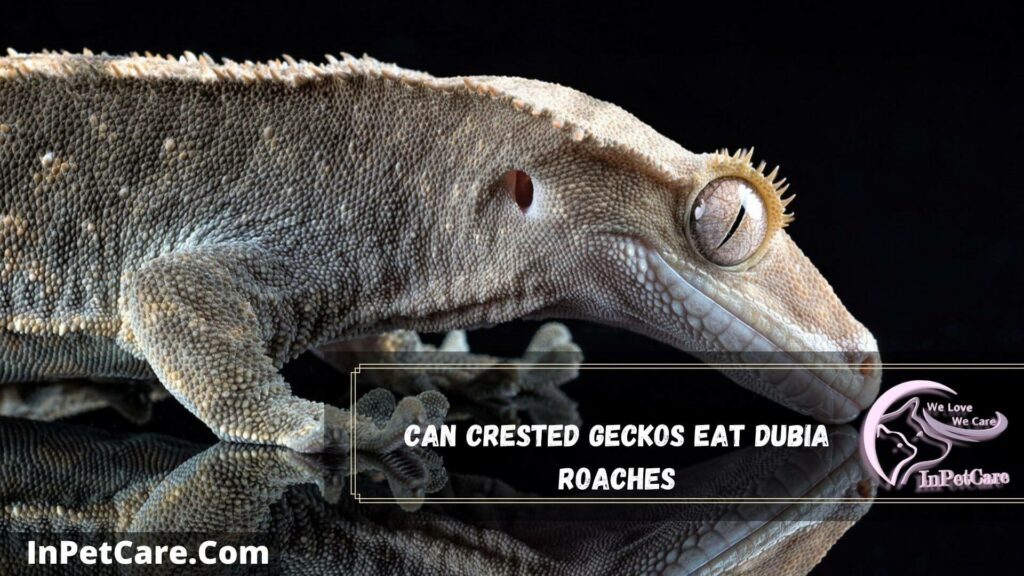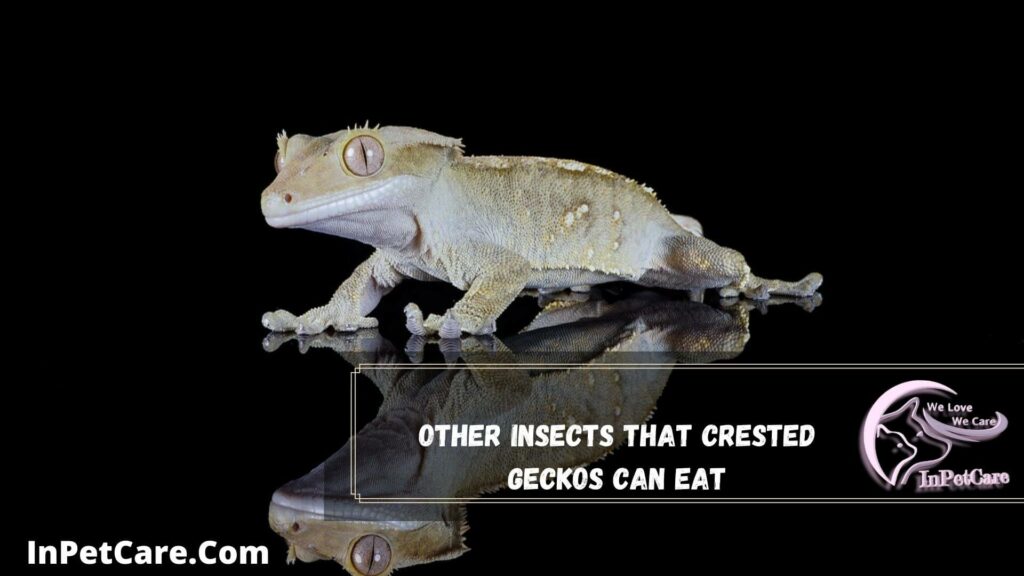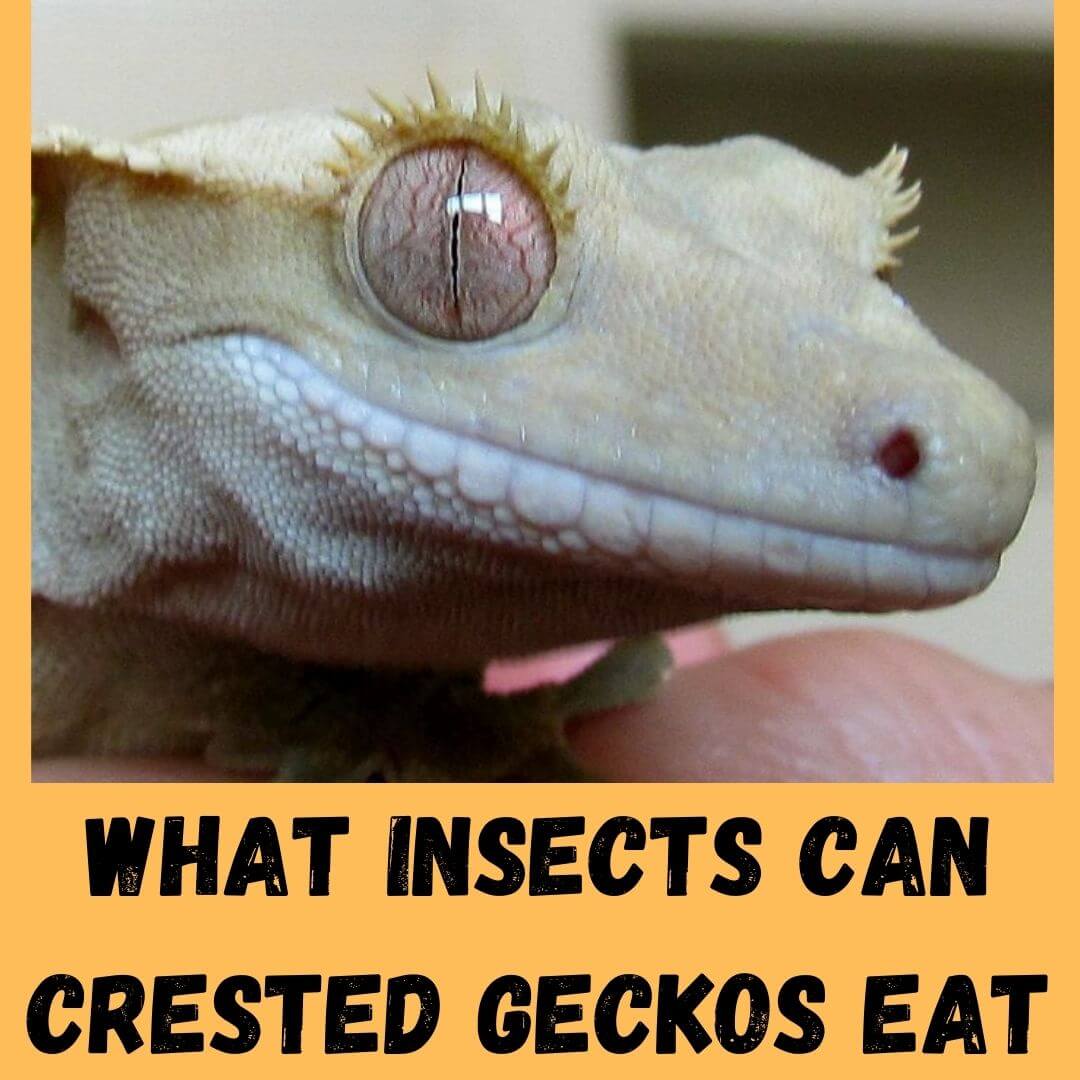In this article, we are going to talk about what insects can crested geckos eat. Before that, you must know that their insects should be gut fed and dusted with calcium before making them lunch for our pet.
There are many insects that crested geckos can freely eat, but mostly, Dubai roaches tend to be high in nutrients. Calcium remains the main intact big deal in your crested gecko’s diet. I would recommend you to use a calcium d3 supplement manufactured by Zoo Med.
Gut loading is necessary to make sure crested geckos get all the nutrients they need for proper body function and health. It is advised to always gut load your insects 24 hours before you offer them to your crested geckos.
Previously, we have learned what fruits custard geckos can eat. Also, read what vegetables crested geckos can eat to mix in their diet.
What Insects Can Crested Geckos Eat?
Can Geckos Eat Roaches?
Yes, crested geckos can eat roaches that are easy to swallow and can fit their mouth. You should provide them with small Dubai roaches or larva. Gut loading the roaches is important.
Don’t feed cØckroaches because crested geckos like preying on higher places, and cØckroaches are not their first choice.
They mostly go for spiders rather than cØckroaches. You should avoid feeding any home-caught cØckroach because it usually carries many parasites and bacteria.
Some healthy dubia roaches are not only going to help your crested geckos get rid of food waste but can also cure some stomach problems.
Can Crested Geckos Eat Ants?
Crested geckos should never eat ants because it can even kill them. Live ants can bite your crested gecko and injure them. The chances of your geckos getting a bite from an ant before they get a chance to eat them is extremely high.
However, one species of gecko preys primarily on ants, but cresties are not evolved to do so. Although ants have many nutrients like fat, protein, carbohydrate, they should be avoided as they can sicken and kill your gecko.
Can Crested Geckos Eat Dried Mealworms?
Crested geckos can eat dried mealworms, but it is not recommended to offer them as they lack enough moisture that is needed to digest and swallow it conveniently. Dried mealworms will be very hard for a crestie to swallow and digest.
It is always recommended to offer them live insects and live mealworms. If you are having trouble finding live insects around your area, you can also order them online. Live insects should be the major portion of their diet.
Can Crested Geckos Eat Wax Worms?
Crested geckos can be offered wax worms but not dead or dried ones. These worms are like pizzas for our crested geckos. Crested geckos love feeding on wax worms in the wild, but it is not ideally suited as a staple diet for them.
In terms of nutrients, wax worms are useless because they contain high amounts of fat but lack the vitamins and minerals your gecko needs for its well-being and health. Feeding waxworms to your crested gecko once in a while will be bad, but too often or too many can cause issues.
Can Crested Geckos Eat Hornworms
Crested geckos can eat hornworms as much as they can per serving. Although It is not suitable as a staple diet, Hornworms are great because of their softness and moisture. It is very easy to eat and digest for reptiles. It is ok to feed hornworms to adult crested geckos.
Large ones should not be offered to a Juvenile or baby geckos because they cannot be swallowed safely & properly.
However, hornworms are considered a great alternative for cresties diet to add some variety. There are many websites from where you can order live hornworms if you can’t find them locally.
Can Crested Geckos Eat Dubia Roaches?

Crested geckos can eat dubia roaches. Dubia roaches are a great diet to feed. It tends to be nutrient-dense and can be continued as a staple diet also. Crested geckos should only be offered gut-loaded dubia roaches.
In one sentence, crested geckos are fans of live dubia roaches. Make sure to offer small ones to baby geckos. You can find different sizes of live Dubia roaches at local Pet stores or even online.
I recommend you look at the dubia roaches that are about 3/8 of an inch in length for babies. When it comes to feeding juvenile crested geckos, you should go with the dubious ones that have a size of 1/4 inch in length.
Be aware that these Dubai roaches can get up to 1.5 inches long suitable for adult cresties to eat every day. Their body is soft to digest, and being high in moisture, it is easy to swallow.
Can Crested Geckos Eat Superworms?
Being high in fat content, super worms are great as a treat to crested geckos. Crested geckos can eat super worms, but feeding too many can cause obesity as well. Obesity can have negative health consequences on your crested gecko health.
Super worms are considered one of the many treats that crested geckos can enjoy, and it is a part of a healthy balanced diet. Make sure to serve them sparingly as an occasional treat because of their high fat and phosphorus content.
Talking about the feeding frequency, super worms should be offered once per week or once every two weeks for most crested geckos.
Talking about the appropriate size for feeding cresties, 3/8 of an inch is good for babies while 1/4 is good for juveniles. At the same time, adults should be fed adult-sized super worms.
Can Crested Geckos Eat Mealworms?
Crested geckos can eat live mealworms, but dead or dried mealworms are not good for their health as they lack nutrients. In most cases, crested geckos don’t eat an insect that doesn’t move or look dead.
Crested geckos can be fed by various insects like live mealworms, tomato worms, butter worms, silkworms, and wax worms. Talking about the nutrient content found in mealworms, it usually has 20% protein, 13% fat, 62% moisture, and 2% fiber.
When we talk about dried ones, moisture is reduced to only 5%, making it difficult for your gecko to eat, swallow, and digest it properly.
Can Crested Geckos Eat Cricket?
Yes, crested geckos can eat crickets, but they should be live ones. They don’t eat dead crickets. Crickets are one of the easiest insects to purchase from a pet store because of their wide availability. However, the number of crickets to offer in one serving depends upon your crested gecko’s age.
If you consider feeding crickets to baby geckos, then it should be extra small-sized. 4-6 extra small crickets are enough once a week for your baby geckos.
Can I Feed My Crested Gecko Dead Insects?
Crested geckos don’t like feeding on dead insects. They don’t even look at insects that don’t move. You can try feeding your cresties with canned or dried insects, but chances are, they won’t eat this.
The possibility of crested geckos not eating the dead insects is very high. However, you can try feeding dead insects to your crested geckos after dusting them with some calcium powder.
Other Insects That Crested Geckos Can Eat

Most time, crested geckos won’t eat dead and frozen insects. Plus, In most cases, they don’t even look very eager to eat live insects. Always supplement their food with calcium supplements. Now, we are going to talk about all the insects that crested geckos can eat.
Always remember that based on the level of nutrients and the health of your crested geckos, the type of insects should be offered. Staple insects can be fed to crested geckos every time they want to eat. However, treats should only be fed once per week.
Staples (2-3 times per week):
- Dubia Roaches
- Black Soldier Fly Larvae (Nutrigrubs)
- Butterworms
- Crickets
- Superworms
- Silkworms
Treats (Once per week):
- Hornworms (high in nutrients but also high in hydration, can cause diarrhoea)
- Waxworms (Well rounded nutrition but very high in fat)
- Mealworms (Hard chitin, ideally should be avoided)
- Locust.
- Black, Brown, and banded crickets.
- Snails.
- Blue-bottles.
- Stick insects.
- Dubia, Turkistan, lobster, domino, banana, discoid roaches.

94% of pet owners say their animal pal makes them smile more than once a day. In 2007, I realized that I was made for saving Animals. My father is a Vet, and I think every pet deserves one. I started this blog, “InPetCare”, in 2019 with my father to enlighten a wider audience.

